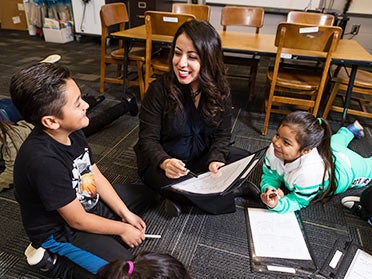Learn how to develop research-based strategies to help students across grade levels with their literacy needs. In this program, you will acquire research-based assessment skills and instructional approaches to aid struggling readers.
Locations
- Fully online (Fall, Spring and Summer entry)
Why Pursue an MEd in Reading Education at Georgia Southern?
- Earn your degree in just two years.
- Enjoy the flexibility of fully-online coursework.
- Qualify for a higher-level certificate upon completing coursework.
Georgia Southern’s fully-online MEd in Reading Education combines theory with practice to prepare you for the fast changing world of literacy instruction. In your courses, you will learn how to help people at all grade levels take the steps they need to become successful, independent readers.
Graduates of the program will qualify for a level 5 Georgia certificate upgrade upon completing all degree requirements. After passing the GACE Content Assessment for Reading Education, candidates can have the field of “Reading Specialist’ added to their teaching certification. Candidates entering the program with a level 4 certificate in Elementary Education or Middle Grades Reading Education will receive a level 5 in-field certificate upgrade upon successful completion of all program requirements.
The program also offers students a high level of flexibility. Whether you are a working individual, off-campus student or live out of the country, the 36 credit hour, fully-online program can acclimate to any schedule or situation.
Upon graduation, your skillset can translate to a variety of professional sectors, not just the classroom. Your time at Georgia Southern will have uniquely prepared you to conduct research, develop curriculum and advocate for literacy projects that support broader communities.
Ready to Apply?
Or, you can:
What Can You Do With an MEd in Reading Education?
Whether working with students, teachers or adults, your MEd will prepare you to design, teach, assess and implement strategies to improve people’s literacy, reading comprehension and their curriculum.
Where our graduates work:
- Elementary schools
- Middle schools
- High schools
- School districts
- Educational companies
- Nonprofits
What our graduates do:
- Classroom Teachers
- Reading specialist
- Interventionist
- Learning design specialist
- Instructional coordinator
- Adult literacy instructor
What You’ll Learn
In this program, you will learn literacy theories, effective methods of instruction and assessment and current trends in the field.
See the Reading Education MEd Curriculum View the Course Rotation Read Course DescriptionsStudent Resources
From advisement and college forms to grants and clinical practice experience, our Student Resources page has what you will need.

Get Involved
The College of Education hosts several student organizations where you can find support and networking opportunities among your peers.

Assistive Technology
Assistive Technology (AT) is vital to helping children with disabilities thrive in the classroom. Learn more about Georgia Southern’s resources for understanding how to use AT successfully.
Take Action
Application Deadlines:
- Fall: July 1
- Spring: November 1
- Summer: April 1
The application and all required documents listed on the “admissions requirements” tab for the program must be received by the deadline. If all required documents are not received by the deadline, your application will not be considered for admission.
Follow these steps to complete the Georgia Southern application:
- Complete requirements for a bachelor’s degree from a regionally accredited institution.
- Possess or be eligible for a Georgia level four or higher Induction, Professional, Advanced Professional, or Lead Professional teaching certificate in an eligible concentration area, or possess an equivalent out-of-state teaching certificate in the concentration area. Candidates who have completed all requirements for the Georgia level four teaching certificate have until the end of the first semester to obtain their certificate. Candidates with an out-of-state certificate will not receive Georgia certification upon program completion.
- Present a cumulative 2.50 (4.0 scale) grade point average.
- Submit a personal statement of purpose, not to exceed 200 words, that identifies the applicant’s reasons for pursuing graduate study and how admission into the program relates to the applicant’s professional aspirations.
Provisional Admission
Applicants may be approved for provisional admission based on the quality of the admission material presented. Provisional students must earn grades of “B” or higher in their first nine (9) credit hours of course work after admission and meet any other stipulations outlined by the department to be converted to regular status.
Note: International transcripts must be evaluated by a NACES accredited evaluation service and must be a course by course evaluation and include a GPA.
The Georgia Southern University Office of Graduate Admissions oversees the application process for graduate students. You can apply today and review requirements and deadlines.
The educator will qualify for a level 5 Georgia certificate upgrade with a new Field program upon:
- Successful completion of all program requirements
- Achieving a passing score on the required GACE Content Assessment for Reading Education
- Applying for and successfully adding the Reading Education Program to the educator’s GaPSC certificate
Candidates entering the program with a level 4 certificate in Elementary Education or Middle Grades Reading Education will receive a level 5 in-field certificate upgrade upon successful completion of all program requirements. If these students wish to add Reading Education as a new field to their certificate, they must:
- Successfully complete all program requirements
- Achieve a passing score on the required GACE Content Assessment for Reading Education
- Apply for and successfully add the Reading Education Program to the educator’s GaPSC certificate
What is an Add-On?
The Add-On P-12 Certificate as a Reading Specialist is intended for individuals who have already earned an MEd in another field but who wish to obtain the P-12 certificate. It requires all four Reading courses required for the MEd in Reading (that is, the three Endorsement classes plus READ 7230 Issues and Trends in Reading). The Add-On also requires passing the GACE.
What is the difference between the Endorsement and the Certificate?
The Endorsement matches the grade levels of your initial certification. The Certificate allows you to teach reading from preschool through grade 12.
Can I get the Reading Endorsement first and then go on and get my master’s?
Yes. You may take three graduate courses as a nondegree student before entering the MEd program. These three courses could be those required for the Endorsement. Or, if you are already MEd program, you may apply for the Endorsement as soon as you finish the three courses.
Do I need to take any tests to get the Reading Endorsement?
No, but should you choose to go on and work toward a degree, you will have to submit test scores.
Do I need to submit the Immunization Form to get the Reading Endorsement?
Yes. Keep in mind, however, that the state permits you to claim a religious exemption if you choose. You must still submit the form, however.
Can I mix classes from Southern and another university to qualify for the Endorsement?
You must take two of the three Endorsement classes from Georgia Southern, and the third course must be from an institution with a PSC-approved Reading Endorsement program.
After I complete the three required courses, how do I apply for the Reading Endorsement?
Go to www.gapsc.com and download the Application for Certification packet. Complete the forms and mail them to the Education Advisement Center, Georgia Southern University, P O Box 8029, Statesboro, GA 30460 along with a note requesting that the completed forms be returned to your school system office. Or to have a set of forms mailed to you, call the Student Success Center at 912-681-0698.
Do I have to take the GACE State Exam to obtain the Reading Endorsement?
No.
Do I have to take the GACE to obtain the MEd?
No.
Do I have to take the GACE to obtain my P-12 Certificate as a Reading Specialist?
Yes, but you may wait until after you complete the MEd
Can I transfer courses as part of my MEd?
Yes, the Board of Regents allows two graduate courses from an accredited university to be used as part of your master’s. They must be approved by your advisor. Be aware that transfer credits may not be earned during the semester you intend to graduate because your grades cannot be confirmed in time to clear you for graduation.
What do I need to do to prepare for graduation?
There are two requirements and you will be responsible for overseeing them:
- You must have a Program of Study on file with the Graduate School. You can download this one-page form from this site and complete it as you progress. When you have decided on the last of your electives, fax it to your advisor. He will double-check it and submit it for you.
- Near the beginning of the term you plan to graduate, you must apply for graduation. There is a one-page form for this purpose, and it requires a $50 fee.
International Literacy Association Standards for Reading Professionals:
Standard 1: Foundational Knowledge
- Candidates understand the theoretical and evidence-based foundations of reading and writing processes and instruction.
- Foundational knowledge is at the core of preparing individuals for roles in the reading profession and encompasses the major theories, research, and best practices that share a consensus of acceptance in the reading field. Individuals who enter the reading profession should understand the historically shared knowledge of the profession and develop the capacity to act on that knowledge responsibly. Elements of the Foundational Knowledge Standard set expectations in the domains of theoretical and practical knowledge, and in developing dispositions for the active, ethical use of professional knowledge. Expectations are founded on the concept of a profession as both a technical and moral enterprise, that is, competent performance for the betterment of society.
Standard 2: Curriculum and Instruction
- Candidates use instructional approaches, materials, and an integrated, comprehensive, balanced curriculum to support student learning in reading and writing.
- The Curriculum and Instruction Standard recognizes the need to prepare educators who have a deep understanding and knowledge of the elements of a balanced, integrated, and comprehensive literacy curriculum and have developed expertise in enacting that curriculum. The elements focus on the use of effective practices in a well-articulated curriculum, using traditional print, digital, and online resources.
Standard 3: Assessment and Evaluation
- Candidates use a variety of assessment tools and practices to plan and evaluate effective reading and writing instruction.
- The Assessment and Evaluation Standard recognizes the need to prepare teachers for using a variety of assessment tools and practices to plan and evaluate effective reading and writing instruction. The elements featured in this standard relate to the systematic monitoring of student performance at individual, classroom, school, and systemwide levels. Teacher educators who specialize in literacy play a critical role in preparing teachers for multifaceted assessment responsibilities.
Standard 4: Diversity
- Candidates create and engage their students in literacy practices that develop awareness, understanding, respect, and a valuing of differences in our society.
- The Diversity Standard focuses on the need to prepare teachers to build and engage their students in a curriculum that places value on the diversity that exists in our society, as featured in elements such as race, ethnicity, class, gender, religion, and language. This standard is grounded in a set of principles and understandings that reflect a vision for a democratic and just society and inform the effective preparation of reading professionals.
Standard 5: Literate Environment
- Candidates create a literate environment that fosters reading and writing by integrating foundational knowledge, instructional practices, approaches and methods, curriculum materials, and the appropriate use of assessments.
- The Literate Environment Standard focuses on the need for candidates to synthesize their foundational knowledge about content, pedagogy, the effective use of physical space, instructional materials and technology, and the impact of the social environment to create an environment that fosters and supports students’ traditional print, digital, and online reading and writing achievement. This standard recognizes that candidates must create a literate environment that meets the diverse needs of students and facilitates connections across content areas as well as with the world outside the school.
Standard 6: Professional Learning and Leadership
- Candidates recognize the importance of, demonstrate, and facilitate professional learning and leadership as a career-long effort and responsibility.
- The Professional Learning and Leadership Standard is based on a commitment by all reading professionals to lifelong learning. Professionals learn in many different ways, for example, individual learning through activities such as reading, pursuing advanced degrees, and attending professional meetings. The elements featured in this standard include an emphasis on positive dispositions, individual and collaborative learning, the ability to design and evaluate professional learning experiences, the importance of advocacy, and a need for knowledge about adult learning and school leadership. Also, learning is often collaborative and occurs in the workplace through grade-level meetings, academic team meetings, workshops, study groups, and so forth.
The College of Education at Georgia Southern is accredited by the following bodies:
- The Council for the Accreditation of Educator Preparation (CAEP)
- The Georgia Professional Standards Commission (GaPSC)
- The Council for Accreditation of Counseling and Related Educational Programs (CACREP)
- The National Association of School Psychologists (NASP)
For more information, visit the College of Education.
The College of Education offers several scholarships and grant opportunities for graduate students. For an overview, please visit here.
Tuition and fees charged by Georgia Southern University are approved by the University System of Georgia annually. For a comprehensive costs and affordability analysis, please visit here.
The College of Education anticipates that graduates of the MEd Reading Education program will seek a certification upgrade. The program listed above leads to a Georgia Certificate Upgrade only. Visit the Georgia Professional Standards Commission for more information.
Federal Law requires colleges and universities to make certain disclosures to prospective students of these programs. These disclosures include information on the University’s authority to operate outside of Georgia, the complaint processes, adverse actions, refunds, and program closure.
For required disclosures about online programs offered by the University, visit the Georgia Southern State Authorization and Professional Licensure Webpage.

Take the Next Step
Make a difference today in the efforts to expand literacy. Learn more about earning your MEd in Georgia Southern’s Reading Education program.
Contact Us
Program Coordinator
Alma Stevenson, Ph.D.
Phone: 912-478-5545
Fax: 912-478-5382
almastevenson@georgiasouthern.edu
Graduate Academic Services Center
Georgia Southern University
College of Education
P.O. Box 8083
Statesboro, GA 30460
Phone: 912-478-1447
Fax: 912-478-5093
gasc@georgiasouthern.edu



